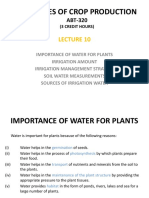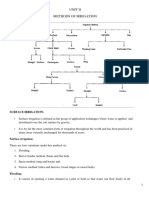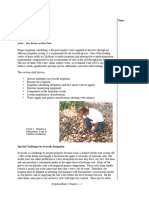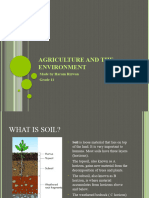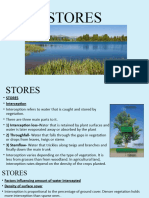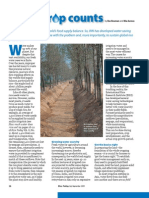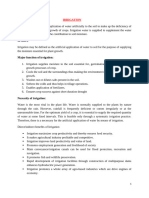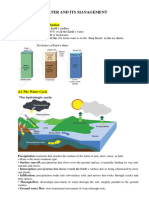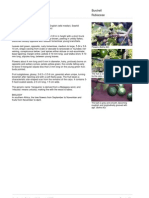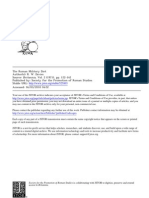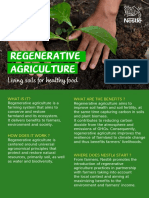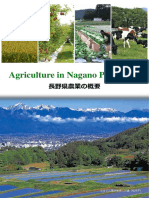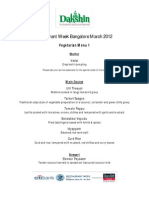Agric Nores-1-23-12-14
Agric Nores-1-23-12-14
Uploaded by
pmnemaembeniCopyright:
Available Formats
Agric Nores-1-23-12-14
Agric Nores-1-23-12-14
Uploaded by
pmnemaembeniOriginal Title
Copyright
Available Formats
Share this document
Did you find this document useful?
Is this content inappropriate?
Copyright:
Available Formats
Agric Nores-1-23-12-14
Agric Nores-1-23-12-14
Uploaded by
pmnemaembeniCopyright:
Available Formats
• to irrigate artificial pastures (e.g. alfalfa).
➢ Water used for crop farming
• Water used to water (irrigate) crops.
• Water management done by:
• choosing crops according to rainfall (e.g. planting drought-tolerant crops:
sorghum instead of maize)
• growing crops that have a short growing season (e.g. sunflower)
• conserving rainwater in the soil
• using suitable irrigation → has advantages –
• increases the chances of a good harvest
• enables crops in low rainfall areas that could not normally grow there
• enables farmers to grow plants during the dry season
• Improves yield per hectare
• Increases cropping frequency so that crops can be harvested two or
three times per year on the same land.
Conserving rainwater in the soil
Rainwater can:
• run off along the surface of the ground → does not reach plant roots
• evaporate
• enter the soil.
So, to conserve water:
• reduce evaporation by mulching
• increase the amount of rainwater that enters the soil:
• Method 1: stop soil erosion.
• Method 2: pocketing water → make shallow pockets in the soil.
• Method 3: end-of-season ploughing → at the end of the rainy season
the soil is still moist → when the next rainy season starts, the soil is
loose.
• Method 4: no-tillage farming → crop remains to form mulch → prevents
evaporation and soil doesn’t become compacted
• Method 5: preserving the plant cover → decreases water runoff →
prevents soil compaction.
Quality of irrigation water
Water tests
Testing for Dissolved salts in water or soil causes salinity.
salinity and
Water with a high amount of salt becomes saline. If you use saline
sodicity
water to irrigate your crops, the soil will become saline. Very few
types of crops grow well in saline soils. The only way to get the salts
out of the soil is to wash the salts
down. This is done by watering the soil with a large amount of water
that does not contain salts. The soil needs to be washed down every
1–2 years
Sodium-containing salts in the water causes sodicity.
Testing for Irrigation water may contain toxic chemicals, e.g. boron and
toxic chemicals manganese. This will make the soil toxic too.
Turbidity Turbidity is muddiness caused by soil particles and organic materials
in the water. These particles can block sprinkler and drip irrigation
systems. These problems can be reduced with the use of settling
tanks and filters.
Biological Micro-organisms from human sewerage, animal housing or runoff
matter water can endanger animal and plant health.
Water laboratories test water to ensure suitable quality.
➢ Factors affecting water supply in agriculture
Water supply is influenced by rainfall. The rainfall of an area has three
important aspects:
• average annual rainfall
• seasonal distribution
• intensity.
➢ Average annual rainfall
• Rainfall in SA is extremely variable: it ranges from droughts to flooding.
• Only one third of SA receives more than 600 mm of rain, the minimum for
successful crop production.
• The remaining two-thirds of the country is used for livestock grazing natural
vegetation.
➢ Seasonal distribution
The season in which it rains determines the crops:
• crops that grow well in cooler temperatures will grow better in winter rainfall
areas
• crops that grow well in warm or hot temperatures will grow better in summer
rainfall areas than winter rainfall areas
• winter cereals (wheat, barley, oats) are grown in winter in the winter rainfall
areas or under irrigation in the summer rainfall areas.
➢ Intensity
Most of South Africa faces a shortage of water. Even in the higher rainfall areas
on the eastern side of the country, periods or seasons of drought can occur.
• In most summer rainfall areas, thundershowers occur: short and intense rainfall
→ results in the flooding of rivers and low-lying areas → flooding can wash
away crops and the fertile layer of topsoil.
• If the intensity is too low, especially when temperatures are high, the rainfall
may evaporate.
• In the winter rainfall areas, the rain usually falls in long periods of soft rain.
To avoid crop failure, farmers need to manage water well.
➢ Basic agricultural practices that contribute to water pollution
• Agriculture uses 70% of the Earth’s surface water supplies.
You might also like
- Animal Farm TBDocument52 pagesAnimal Farm TBEvie75% (4)
- SWE351 17 Dry Farming TechniquesDocument28 pagesSWE351 17 Dry Farming TechniquesAnil KumarNo ratings yet
- 1. Water Availability and QualityDocument77 pages1. Water Availability and Qualitydanelle govenderNo ratings yet
- Water Management 023833Document24 pagesWater Management 023833Silvano MarcoNo ratings yet
- Topic 2. Land ResourcesDocument21 pagesTopic 2. Land Resourcesshubhranshu1438No ratings yet
- Prueba 2-09Document3 pagesPrueba 2-09rado.valentinaNo ratings yet
- Irrigation Unit 1Document28 pagesIrrigation Unit 1raaiNo ratings yet
- Horti-Fingertips-DemoDocument29 pagesHorti-Fingertips-DemoVarun KashyapNo ratings yet
- Agric Nores-1-23-6-8Document3 pagesAgric Nores-1-23-6-8pmnemaembeniNo ratings yet
- Irrigation Engineering Class NotesDocument145 pagesIrrigation Engineering Class Noteskkcollins395No ratings yet
- Methods of Irrigation NotesDocument20 pagesMethods of Irrigation NotesBikash ChaudharyNo ratings yet
- Dryland AgricultureDocument15 pagesDryland Agriculturejustraju6777No ratings yet
- HDRA Water Harvesting and Conservation PDFDocument24 pagesHDRA Water Harvesting and Conservation PDFciprushomeNo ratings yet
- Irrigation EngineeringDocument4 pagesIrrigation EngineeringJennifer LlantadaNo ratings yet
- Dryland Agriculture: 1. Dry FarmingDocument17 pagesDryland Agriculture: 1. Dry Farmingashok kumar singhNo ratings yet
- Farm Water Management - Er DR BagaleDocument150 pagesFarm Water Management - Er DR BagaleArus JoshiNo ratings yet
- Irrigation-Day 1 and 2 LectureDocument32 pagesIrrigation-Day 1 and 2 LectureBinayak AdhikariNo ratings yet
- Agric Nores-1-23-3-4Document2 pagesAgric Nores-1-23-3-4pmnemaembeniNo ratings yet
- SalineDocument2 pagesSalineapi-302391957No ratings yet
- Principles of Crop ProductionDocument28 pagesPrinciples of Crop ProductionRitik ThakurNo ratings yet
- Water Resources NotesDocument6 pagesWater Resources NotesAnkan RoyNo ratings yet
- U 2 IirigationDocument23 pagesU 2 Iirigationvinoth KumarNo ratings yet
- Presentation 15Document7 pagesPresentation 15raiasheesh52No ratings yet
- Water Logging and ManagementDocument25 pagesWater Logging and ManagementWajeeh ur rehmanNo ratings yet
- Water Management - IRRI Rice Knowledge BankDocument3 pagesWater Management - IRRI Rice Knowledge BankShan Hyeln MagdasocNo ratings yet
- ENVIRONMENTAL Soil ChapterDocument5 pagesENVIRONMENTAL Soil Chaptervalentina.celentanoNo ratings yet
- Water ResourcesDocument52 pagesWater ResourcesjoyaeroNo ratings yet
- G7 Agric & Nutrition.Document40 pagesG7 Agric & Nutrition.bradley omari100% (3)
- CHE 110: Environmental Studies: Unit: 1 - Lecture: 5 - CHE110 - VKDocument17 pagesCHE 110: Environmental Studies: Unit: 1 - Lecture: 5 - CHE110 - VKAditya SajjaNo ratings yet
- Xu Chenyuan Y1 Geography NotesDocument32 pagesXu Chenyuan Y1 Geography NotesVIJAY GANESH LATHISH StudentNo ratings yet
- Chapter 1 Introduction Aau 2014Document45 pagesChapter 1 Introduction Aau 2014Mhiret BekaluNo ratings yet
- Water Logging SalinityDocument33 pagesWater Logging SalinityZaid MustafaNo ratings yet
- Water Logging (2) FIDocument32 pagesWater Logging (2) FIVaish NaoNo ratings yet
- Year 9 Geography Revision Booklet GuideDocument27 pagesYear 9 Geography Revision Booklet Guideshanwg12019No ratings yet
- CH 3 NOTES AgricultureDocument11 pagesCH 3 NOTES AgricultureNavya ChaudhryNo ratings yet
- Avocado IrrigationDocument26 pagesAvocado IrrigationsimohammedNo ratings yet
- Perform Irrigation v2Document8 pagesPerform Irrigation v2VanzNo ratings yet
- Dry Land AgricultureDocument24 pagesDry Land AgricultureHenriett Jankóné MenyhártNo ratings yet
- Salt Efected SoilDocument15 pagesSalt Efected Soilkhanbvc4No ratings yet
- B 2 IrrigationDocument30 pagesB 2 IrrigationsimohammedNo ratings yet
- Water Logging and SalinityDocument13 pagesWater Logging and SalinityMuhammad ShahzaibNo ratings yet
- Growing Lemons in Australia-A Production Manual - Readers' NoteDocument14 pagesGrowing Lemons in Australia-A Production Manual - Readers' NoteMed Medy FehemNo ratings yet
- WATERSHED PresentationDocument44 pagesWATERSHED Presentationy. sreelalitha100% (2)
- Irrigation and Water ManagemenTDocument48 pagesIrrigation and Water ManagemenTAngelyn RodulloNo ratings yet
- Salinity and Sodicity Problems in PakDocument4 pagesSalinity and Sodicity Problems in Pakahmad77ftiktokNo ratings yet
- Agric Nores-1-23-4-5Document2 pagesAgric Nores-1-23-4-5pmnemaembeniNo ratings yet
- Agriculture and The EnvironmentDocument23 pagesAgriculture and The Environmenttaj qaiserNo ratings yet
- Consumptive-Use-and Water Requirements of Different CropsDocument17 pagesConsumptive-Use-and Water Requirements of Different Cropsdaniel,jr BALDOZNo ratings yet
- Water ConservationDocument30 pagesWater ConservationsubhashiniNo ratings yet
- DesertificationDocument21 pagesDesertificationapi-359900292No ratings yet
- Untitled PresentationDocument8 pagesUntitled PresentationnotnoxiumNo ratings yet
- Intro To Water Management and IrrigationDocument22 pagesIntro To Water Management and IrrigationJulius Jimenez100% (2)
- IrrigationDocument15 pagesIrrigationshaimulislam250No ratings yet
- RT Vol. 8, No. 3 Every Drop CountsDocument3 pagesRT Vol. 8, No. 3 Every Drop CountsRice TodayNo ratings yet
- Irrigation MethodDocument52 pagesIrrigation Methodarifurrahman3579No ratings yet
- Lesson 2Document19 pagesLesson 2peter aguirreNo ratings yet
- IrrigationDocument52 pagesIrrigationDhyllan CastroNo ratings yet
- Environmental Management NotesDocument10 pagesEnvironmental Management NotesasranisairaNo ratings yet
- IKSP Report G4Document23 pagesIKSP Report G4Bangunan Mengfie Jr.No ratings yet
- Drainage Engineering 2Document144 pagesDrainage Engineering 2Dagmawi ShimelisNo ratings yet
- A Beginner's Guide to Annuals and Biennials: Essential guide for A Beautiful GardenFrom EverandA Beginner's Guide to Annuals and Biennials: Essential guide for A Beautiful GardenNo ratings yet
- Agricultural Handling SolutionDocument11 pagesAgricultural Handling Solutiondionis37No ratings yet
- Avian FluDocument4 pagesAvian Fluapi-359754195No ratings yet
- Poverty and Social Assessment - A Districtwise Study of BiharDocument33 pagesPoverty and Social Assessment - A Districtwise Study of BiharmkshrighyNo ratings yet
- NSPM 22 Guidelines For Accreditation of FADocument70 pagesNSPM 22 Guidelines For Accreditation of FAKasyap IksNo ratings yet
- History - Britan 1750'sDocument2 pagesHistory - Britan 1750'sTheJazzAgeNo ratings yet
- The Peasant Question From Marx To Lenin: The Russian Experience - Nirmal Kumar ChandraDocument12 pagesThe Peasant Question From Marx To Lenin: The Russian Experience - Nirmal Kumar ChandragrootvaderNo ratings yet
- Vangueria Infausta DescriptionsDocument5 pagesVangueria Infausta DescriptionsNanoManNo ratings yet
- The Last Will and Testament of Cecil J. Rhodes PDFDocument215 pagesThe Last Will and Testament of Cecil J. Rhodes PDFLucas ArrudaNo ratings yet
- Geography Paper VII (GrpA)Document9 pagesGeography Paper VII (GrpA)sabeehaNo ratings yet
- Gehc 107Document12 pagesGehc 107Kalpavriksha1974No ratings yet
- The Roman Military DietDocument22 pagesThe Roman Military DietTavrvs Paolo Bergamini100% (1)
- A Detailed Lesson Plan in Technology and Home EconomicsDocument3 pagesA Detailed Lesson Plan in Technology and Home EconomicsBethel Aleli Mones82% (45)
- Regenerative Agriculture One Pager - EnglishDocument2 pagesRegenerative Agriculture One Pager - EnglishJoseph AYNo ratings yet
- History - Indus Valley CivilizationDocument4 pagesHistory - Indus Valley CivilizationTejasree 416No ratings yet
- Guide Questions To Reflect OnDocument2 pagesGuide Questions To Reflect OnJudd Ralph SamaniegoNo ratings yet
- Written Test Core 5-6Document4 pagesWritten Test Core 5-6michael sto domingoNo ratings yet
- 100 Retete PT BLWDocument25 pages100 Retete PT BLWLoredana ConstantinescuNo ratings yet
- Agriculture in Nagano PrefectureDocument16 pagesAgriculture in Nagano PrefectureOrca DanNo ratings yet
- Farm ToolsDocument9 pagesFarm ToolsBabila PenskieNo ratings yet
- Avdenio Lexicon (Sorted)Document62 pagesAvdenio Lexicon (Sorted)api-288750682No ratings yet
- Presentation 1 - Disney PDFDocument23 pagesPresentation 1 - Disney PDFCam TrudelNo ratings yet
- Agra Final TableDocument4 pagesAgra Final TableJohn Patrick IsraelNo ratings yet
- Smart Farming Using IOTDocument20 pagesSmart Farming Using IOTSumanth H TNo ratings yet
- INAPH ToT PracticeDocument4 pagesINAPH ToT PracticedrnaviNo ratings yet
- Checklist PigDocument4 pagesChecklist PigNBNo ratings yet
- Silage (Microbial Technology)Document17 pagesSilage (Microbial Technology)Siti RosmanirahNo ratings yet
- Lemon GrassDocument18 pagesLemon GrassAmit KatareNo ratings yet
- Dakshin MenuDocument4 pagesDakshin MenuNarendra HebbaniNo ratings yet
- Project Proposal CFW Lean MonthsDocument2 pagesProject Proposal CFW Lean MonthskapeatbutasNo ratings yet



















